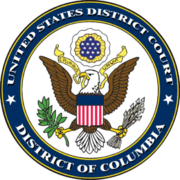Thompson v. Trump
| Thompson v. Trump | |
|---|---|
 | |
| Court | United States District Court for the District of Columbia |
| Full case name | Bennie G. Thompson, et al v. Donald J. Trump et al |
| Citation(s) | No. 1:21-cv-00400 |
| Court membership | |
| Judge(s) sitting | Amit Mehta |
Thompson v. Trump is an ongoing federal civil case filed in February 2021 on behalf of U.S. House Representative Bennie Thompson against former U.S. president Donald Trump. The lawsuit claims that Trump and others conspired to incite the January 6 United States Capitol attack. In February 2022, District of Columbia U.S. District Court Judge Amit Mehta ruled that presidential immunity did not shield Trump from the lawsuit. In March 2022, Trump appealed Mehta's ruling to the U.S. District of Columbia Circuit Court of Appeals. In December 2023, the Court of Appeals upheld Mehta's ruling.
Background
On February 16, 2021, the National Association for the Advancement of Colored People (NAACP) filed a lawsuit on behalf of Thompson against former President Donald Trump, Rudolph Giuliani, the Proud Boys and the Oath Keepers.[1] The lawsuit centered around the 1871 Ku Klux Klan Act, designed to protect members of Congress from violent conspiracies that interfere with their official Congressional duties.[2] In an interview with The Guardian, NAACP President Derrick Johnson stated that the "former administration and Giuliani sought to disqualify our votes" and accused Trump of "operating under a white supremacist doctrine that was a derived [sic] from days of the Confederacy".[3]
On April 7, 2021, ten more Representatives joined the suit as plaintiffs. They were Steve Cohen, Karen Bass, Bonnie Watson Coleman, Veronica Escobar, Hank Johnson, Marcy Kaptur, Barbara Lee, Jerry Nadler, Pramila Jayapal, and Maxine Waters.[4] In July 2021, Representative Thompson withdrew from the suit to avoid any conflict with the January 6 House Select Committee (which he chaired), while the other plaintiffs, who were not on the Committe, moved forward.[5]
Judge Mehta consolidated Thompson v. Trump with two other suits before him—Swalwell v. Trump (brought by Representative Eric Swalwell) and Blassingame v. Trump (brought by two U.S. Capitol Police officers)—to consider whether Trump and the other defendants were immune from liability. The defendants had requested immunity on the grounds of the First Amendment, and those who were elected officials also claimed immunity based on that status. Mehta ruled in February 2022 that presidential immunity did not shield Trump from the lawsuits.[6] Trump then appealed the consolidated cases to the District of Columbia Circuit Court of Appeals in March 2022, claiming absolute immunity.[7][8][5]
In December 2023, the Court of Appeals (with judges Gregory G. Katsas, Judith W. Rogers, and Sri Srinivasan presiding) upheld Mehta's ruling that Trump was not immune because Trump was acting "as an office-seeker not office-holder" due to his speech on January 6 being a campaign event, and as such, did not fall within the "outer perimeter" standard established in Nixon v. Fitzgerald (1982).[9][10][11][12][13][14][15][16][5]
See also
- 2024 presidential eligibility of Donald Trump
- Federal prosecution of Donald Trump (election obstruction case)
- Trump v. Anderson (2024)
- United States free speech exceptions
References
- ^ Karni, Annie (February 16, 2021). "N.A.A.C.P. Sues Trump and Giuliani Over Election Fight and Jan. 6 Riot". The New York Times. Retrieved January 30, 2024.
- ^ King, Maya (February 16, 2021). "NAACP sues Trump and Giuliani after Jan. 6 riots". Politico. Retrieved October 1, 2022.
- ^ Evelyn, Kenya (February 26, 2021). "We're suing to hold Trump accountable for 'treasonous acts', NAACP chief says". The Guardian. Retrieved March 1, 2021.
- ^ Schneider, Jessica (April 7, 2021). "Ten more members of Congress join lawsuit against Trump and Giuliani | CNN Politics". CNN. Retrieved March 26, 2024.
- ^ a b c Mihm, Karl; Apkon, Jacob; Venkatachalam, Sruthi (January 30, 2023). "Litigation Tracker: Pending Criminal and Civil Cases Against Donald Trump". Just Security. Retrieved January 8, 2024.
- ^ Tau, Byron (February 18, 2022). "Judge Allows Lawsuits to Proceed Against Donald Trump, Militia Groups in Jan 6. Lawsuit". The Wall Street Journal. News Corp. Retrieved October 5, 2023.
- ^ Cheney, Kyle; Gerstein, Josh (November 27, 2023). "Bid to hold Trump accountable for Jan. 6 violence stalls at appeals court". Politico. Axel Springer SE. Retrieved November 29, 2023.
- ^ Barber, C. Ryan (March 2, 2023). "Trump Can Be Sued Over Role in Jan. 6 Attack, Justice Department Says". The Wall Street Journal. News Corp. Retrieved October 5, 2023.
- ^ 87 F.4th 1 D.C. Cir. 2023
- ^ https://www.cadc.uscourts.gov/internet/opinions.nsf/A3464AEB2C1CB89985258A7800537E73/$file/22-5069-2029472.pdf
- ^ https://www.govinfo.gov/content/pkg/USCOURTS-caDC-22-05069/pdf/USCOURTS-caDC-22-05069-0.pdf
- ^ https://storage.courtlistener.com/recap/gov.uscourts.cadc.38510/gov.uscourts.cadc.38510.2029472.0.pdf
- ^ https://storage.courtlistener.com/recap/gov.uscourts.cadc.38510/gov.uscourts.cadc.38510.1208575879.0_2.pdf
- ^ Polantz, Katelyn; Lybrand, Holmes (December 1, 2023). "Trump doesn't have presidential immunity from lawsuits over January 6, appeals court rules". CNN. Retrieved December 1, 2023.
- ^ Weiner, Rachel; Hsu, Spencer S. (December 1, 2023). "Trump can be held civilly liable in Jan. 6 riot, judges rule". The Washington Post. Retrieved December 1, 2023.
- ^ Nixon v. Fitzgerald, 457 U.S. 731 (1982)
External links
- Case docket for Thompson v. Trump, 1:21-cv-00400, (D.D.C.) at CourtListener.
- Case docket for James Blassingame v. Donald Trump, 22-5069, (D.C. Cir.) at CourtListener. Appeal to the U.S. District of Columbia Circuit Court of Appeals in Thompson v. Trump was consolidated with Blassingame v. Trump, 1:21-cv-00858 (D.D.C.) and Swalwell v. Trump, 1:21-cv-00586 (D.D.C.).